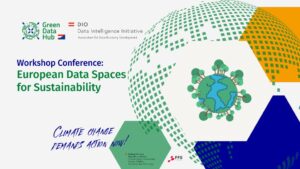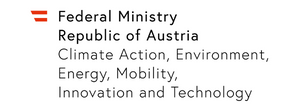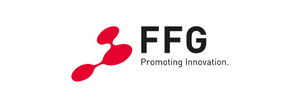
Our goal is to develop solutions that enable collaboration between European markets and across domains in European Data Spaces for Sustainability to fight climate change with data.
You are essential for the solution to the transition towards a more sustainable data-driven future. Your commitment to using data to change the world into a better one and to counteract climate catastrophe efficiently is necessary.
On February 16th, 2023, the Green Data Hub’s Workshop Conference set the course for the enabling international and cross-domain collaboration in European Data Spaces for Sustainability. Top-class experts from business, public administration, research, climate protection and international data ecosystem initiatives discussed, why data is part of the solution we need to achieve the climate goals, how collaboration in a data service ecosystem can contribute to environmental protection, and which key issues need to be tackled most urgently.
Furthermore, three interactive breakout sessions with technical, legal and business experts were held. Data Spaces implementers from the audience discussed the current challenges they face in their practice when collaborating internationally. Thereby, in the course of the Green Data Hub project “International Green Data Spaces (InGDS)”, solution approaches can be developed on a technical, legal, and economical level in the form of implementation-focused building blocks, for the benefit of the entire European data community.
Thank you so much for taking part in the online conference and your contribution as well as your commitment!
Below you will find a summary of the individual programme points:
Speaker: Lisbeth Mosnik (Federal Ministry for Climate Action, Environment, Energy, Mobility, Innovation and Technology (BMK))
Lisbeth Mosnik, Deputy Head of the Department “Key technologies for industrial innovation: ICT, production and nanotechnology” at BMK, opened the GDH workshop conference with the words: “We are here today to fight climate change with data.”
The Green Data Hub workshop conference was about bringing people together, who are interested in actively participating in the European Data Spaces for Sustainability. Lisbeth Mosnik pointed out that the BMK strongly believes in the data service ecosystems as the foundation for digitization in Austria, in Europe and the world. For this vision, there are still many challenges to face. To fight climate change with data, the basis is reliable data that can be exchanged between data users, data providers & data processors. This to happen, it is necessary to establish trust between stakeholders and awareness of the way data is handled in a secure, trustworthy and sovereign way. Data Spaces, like those enabled by the Green Data Hub, facilitate the data sharing cross-domain and also use the international data to contribute to climate goals. To achieve this common perspective, BMK relies heavily on the strong expertise and network of the Data Intelligence Initiative (DIO) and funds the Green Data Hub with the R&D service “International Green Data Spaces (InGDS)”.
Speaker: Günther Tschabuschnig (Data Intelligence Initiative (DIO))
Günther Tschabuschnig, president of the Data Intelligence Initiative (DIO), opened his speech with a warm welcome: “I am impressed by the huge amount of people who joined us today”. Over 80 participants all over Austria and abroad, neighbors across Europe, joined the online workshop conference.
DIO and the Green Data Hub share the vision of working towards a more sustainable data service economy. Together, DIO and GDH, have over 300 stakeholders in Austria, like data providers, data consumers and technical service providers to enforce the data service ecosystem.
The volume of data generated grows from year to year, but often isn’t used for relevant decisions. To get a feeling for the amount of data we are confronted with on a daily basis, Günther Tschabuschnig illustrates the volume of data produced: 463 EB/per day. The general potential of the data service economy in Europe has a worth of 8 bn. €. At the moment only 6% of this potential is being used in Europe.
We are just at the beginning
Data is a new resource. When we compare to other valuable resources like gold, we see that we use them differently than data. When we share gold, both partners get half of it, when we share data, we double it. Data by itself is just numbers: 0-1. To gain insights, we have to connect it to various information variables, so that we can create business value. To set up an efficient data service economy we need experts, technicians, and engineers. Data Governance usually needs a heap of resources. A decentralized data service economy through Data Spaces, can generate quick wins and business value for stakeholders.
At DIO, we design, create and enable Data Spaces for stakeholders. We enforce use cases and empower companies to create use cases as a measure against climate change. DIO also enables working groups with various experts to take on certain topics, like legal issues, open data, blockchain, secure resilient & trustworthy AI, data governance, data protection etc. During the event, DIO discusses upcoming issues and European-wide changes/challenges concerning national and international Data Spaces, as well as partners engagement.
Günther Tschabuschnig concludes his talk with “Let’s change the world with data.“
Find here the presentation slides of the session
Watch the entire keynote in the following video:
- Stephan Dietrich (Green Data Hub Data Space Lead Architect)
- Tobias Hofer (Green Data Hub Community Management & Communications)
Contribution of Data Spaces for the realization of data transformation for sustainability
The goal of GDH is to bring Austrian stakeholders together in use cases, to return best-practice insights to the community to increase further use cases, to enable data economy and to increase real value within the community.
As GDH, we want to collaboratively secure Data Spaces, bring real value to the community and to our partners in the name of ecological sustainability – all with the focus on fighting climate change with data. We are partnering with international initiatives, like GAIA-X, BDVA, IDSA, FIWARE, DSSC etc. to ensure secure and trustworthy data sharing within the Data Spaces. The European regulations and European values are the base of our Data Spaces creation. We believe that Data Spaces should be given a uniform base and should not be build as specific silos.
Therefore, we focus on stakeholders in different branches and regions. We drive use cases with our partners, which contribute to the UN SDGs and bring all insights and results back to the community. The GDH business model is to connect green Data Spaces nationally in Austria, where we work with scientific and economic partners, building up international connectivity.
Joint development of sustainable use cases
Our way to develop Data Spaces for Sustainability is to host co-creation workshops with partners, who set up respective Data Spaces. We are working with design thinking methodology to jointly create use cases, which are implemented within Data Spaces. Our aim is to create business value for participants and also contribute to environmental protection.
Our work at GDH includes connecting use cases across countries and across domains to make scalability possible. While identifying exiting use cases, we provide building blocks to clear the way for international connection across domains. To enable federated connection and expansion of international partnerships, GDH is using a 2 steps methodology:
- Evaluation of status quo, while focusing on sustainability domains
- Qualitative research on challenges
After discussing current challenges in legal, economic and technical areas, GDH develops building blocks based on research and provides solutions across domains as well as a road map.
Let us jointly identify your needs and tackle them within Data Spaces for Sustainability! Drop a mail to connect@greendatahub.at
Find here the presentation slides of the session
Watch the entire keynote in the following video:
“GDH is not just a project, is a way to redirect priorities” – Peter A. Bruck
Peter A. Bruck emphasizes to set up the need to set up Data Spaces in a collaborative way to jointly address the climate crisis. All participants need to learn from each other’s use cases and move beyond these use cases. The decisions we make regarding the climate can impact millions of people’s lives and have serious environmental and economic consequences. It is a question of survivability. The Green Data Hub gives us a sense of urgency in this direction.
Data is a common good
Data is not accumulated by one but is shared. We envision a single data market. Through data exchange, to generate value and to monetize, data must stay public and must be a common good. Peter A. Bruck points out that there is a strong need for more dialogue, clarification of current/future needs and pain points in setting up Data Spaces.
DIO takes on the challenge to create a framework for people who are working on technical solutions, who exchange data and who need data. In the role of a match-maker, DIO – based on data sovereignty and data governance, helps people and organisations to find these common challanges and to tackle them together.
How do we get from good intentions to transformative actions?
To reprioritize Data Spaces, to make them more effective and measurable on different levels, we need to have a closer look at the UN Sustainable Development Goals (SDGs). Our vision is to have Sustainable Data Space Goals (SDSGs) to describe the development progress of the SDGs. So that SDSGs guide our behaviour in the near future.
Find here the presentation slides of the session
Watch the entire keynote in the following video:
Panelists:
- Roland Fadrany (COO of Gaia-X Association)
- Javier Valiño (Omega-X | Head of Energy, Climate & Decarbonization unit of Atos)
- Ana García Robles (Secretary General of BDVA)
- Nevena Raczko (Grean Deal Data Space – GREAT | Senior Consultant of IDC4EU European Consulting Unit)
In the panel discussion, high class experts from relevant European Data Space initiatives discussed the general conditions and the need to cooperate on an international level in order to effectively contribute to environmental protection with data.
They provided exciting insights and answers around the following topics:
- What does “Data for Sustainability” mean to you and how important is this topic in the initiative?
- How will your initiative enable sovereign, collaborative Data Spaces for your organization in the future?
- How would you envision European Data Spaces? Would there be significant differences between Data Spaces for Sustainability and, for example, commercial or a health Data Space?
- Regarding sustainability topics, in which areas would collaboration be particularly useful?
As a glimpse into the panel discussion: Roland Fadrany (Gaia-X Association) & Javier Valiño (Omega-X) provided insights into the current stage of the European data community on the long journey to enabling fully functional Data Spaces. Most important is a community approach: all initiatives currently working with Data Spaces have to join forces and drive chances to move forward in the same directions. Nevena Raczko (Green Deal Data Space – GREAT), shared their vision of establishing a Data Space aiming at supporting the Green Deal and aligning all Data Space initiatives on this matter at an EU level, synergistically with the efforts of the Green Data Hub. Ana García Robles (BDVA), shared their mission of boosting data economy & empowering organizations to share data, joining forces with the Data Spaces Support Center (DSSC), accelerating Data Space development and the importance of aligning goals through collaboration to tackle paralyzation.
Watch the entire panel discussion in the following video:
- Matthias Buchhorn-Roth (Data Spaces Architect, Microsoft)
- Matthias De Bièvre (President, Prometheus-X Education & Skills | Co-Founder & CEO, VISIONS)
The objective of this breakout session was to provide a general overview about the current technical developments in the context of enabling Data Spaces. This introduction served as motivation for the audience to share its current or expected challenges in this concern.
Based on these insights and further research, in the course of the Green Data Hub R&D service, we will develop implementation-focused technical building blocks with solution approaches, which can be used as an orientation for the European data community and thus support cross-national data-driven collaboration.
Matthias De Bièvre, gave an overview about various apps and ecosystems in the domain of education and data catalogs. He spoke about the interaction types between different stakeholders (data providers, data users, data processors) and the requests for data sets. He highlighted the methods to grant access to the data sets and how data contracts are set and signed, based on the multi decentralized approach to identity which standards are planned and used.
Matthias Buchhorn-Roth guided through an interactive discussion how the sentiment of our audience looks like concerning the concepts of Data Space Authority & Identity Provider, the pros and cons of decentralization, policies and how to build trust.
Watch the entire breakout session in the following video:
Moderators:
- Inan Gür (Researcher, Fraunhofer ISST Project IEDS – Incentives and Economics of Data Sharing)
- Anna Gieß (Researcher, Fraunhofer ISST Project IEDS – Incentives and Economics of Data Sharing)
The objective of this breakout session was to provide a general overview about the current challanges in the context of data sharing in our globalized and networked world as well as the need for strategic alliances to create new data-driven business models. As a best practice and as a base for the discussion, Inan Guer presented the German IEDS project, where over 1000 companies had been asked about the status quo of their data economy. Since then, technological advancement has shifted the role of data to a strategic resource, making data sharing indespensible. This session also looked into the recent study by EC showing where Germany ranks in the digitization index compared to EU partners, what the audience recognizes as the the biggest challange and under what conditions sharing it’s own data becomes interesting for companies.
Find here the presentation slides of the session
Watch the entire breakout session in the following video:
Moderator: Georg Hittmair (Authorised Officer (Prokurist), Compass-Verlag | President, PSI Alliance)
In 2016, the EC invited to a workshop to discuss challenges in the data economy. During that event, were addressed in detail all topics about data ownership. The conclusion was that current legal frameworks are not applicable to data. Among the participants, many stakeholders from automotive sector were actively enagaged.
Following that meeting, new topics have emerged:
- increase of data availablilty
- protection of the data of natural persons
- market regulation (protection against market players)
- B2C and B2B IoT data sharing (example from Mercedes B)
- medical images as training data for AI applications
- data altruism (example from Luckycloud)
All those points, play into the direction where the GDPR is currently active.
Also it covers: Data Governance Act, Data Act, PSI, GDPR, Open Data guidelines, Digital Markets Act, Digital Services Act & AI guidelines. All those acts, coexist and influence each other. These regulations build the horizontal layer, and are horizontal to initiatives like Eurostat.
Find here the presentation slides of the session
Watch the entire breakout session in the following video:
Speaker: Jason Stienmetz, Assistant Professor, Modul University Vienna
Jason Stienmetz, the Beneficiary for the Preparatory Action for the European Tourism Data Space and assistant professor at Modul University Vienna talks about the importance of tourism to Europe with two projects working side by side for the Tourism Data Spaces, high competitiveness in tourism and sustainability as a major priority, understanding tourism stakeholders’ needs and the barriers in the Data Space for Tourism.
Watch the entire keynote in the following video:
We would love to collaborate with you and fight climate change with data spaces for sustainability.
Lets utilize and market the results of this event to:
- Use synergies with new partners in Europe.
- Create and develop new sustainable use cases.
- Use DIOs technical and legal expertise. Together we become THE experts for sustainable Data Spaces and use cases in Europe.
- Create measurable impact and make them visible.
Data4Sustainability Award
One of our main findings is that we need to have an overview of all projects and initiatives dealing with fighting climate change with data. The Data4Sustainability Award is a chance to get an overview of all national and international projects, as well as to present them to a broad audience on the European Level. We need to collaborate and consolidate, so that all of our effort is channeled to reach our collective goals and fight climate change.
Get in touch with us, we would love to connect you and hear from you! Drop us an e-mail to connect@greendatahub.at
We are looking forward to bundle our efforts for the environmental protection together with you!

